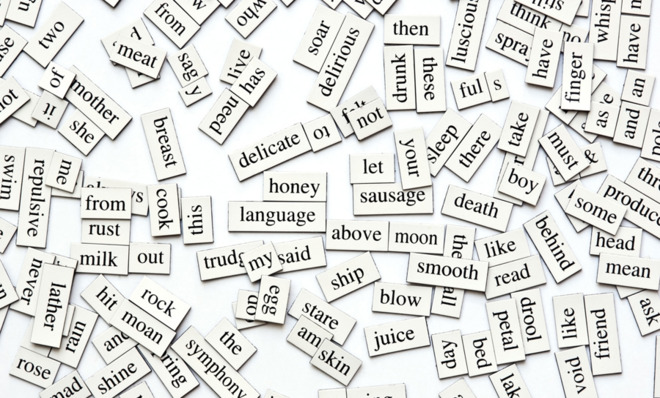Why 'the' is so difficult to define
Why do we say "I love the ballet," but not "I love the cable TV"?


A free daily email with the biggest news stories of the day – and the best features from TheWeek.com
You are now subscribed
Your newsletter sign-up was successful
It's the most frequent word in the English language, accounting for around four percent of all the words we write or speak. It's everywhere, all the time, so clearly it must be doing something important. Words have meaning. That's fundamental, isn't it? So what does "the," a word that seems to be supporting a significant portion of the entire weight of our language, mean? It must mean something, right?
We can say, roughly, that "the" means the word it is attached to refers to a specific, individual object. When I say "I have the apple," I mean a certain apple, not just any old apple, or apples in general.
But, of course, it's not quite that easy. Sometimes "the" doesn't indicate a specific object, but a whole class of objects. When you say you know how to play "the piano" or that exercise is good for "the heart," there is no specific piano or heart you have in mind. "The pen is mightier than the sword" isn't about specific pens or swords — or even about specific instances of their metaphorical counterparts, acts of writing and acts of aggression.
The Week
Escape your echo chamber. Get the facts behind the news, plus analysis from multiple perspectives.

Sign up for The Week's Free Newsletters
From our morning news briefing to a weekly Good News Newsletter, get the best of The Week delivered directly to your inbox.
From our morning news briefing to a weekly Good News Newsletter, get the best of The Week delivered directly to your inbox.
"The" does not seem like a difficult word, but it's very hard to explain to someone who isn't a native speaker. Why do we say, "I love the ballet," but not "I love the cable TV"? Why do we say, "I have the flu," but not "I have the headache"? Why do we say, "winter is the coldest season," and not "winter is coldest season"? For speakers of Russian, Korean, or any language that doesn't have a "the," these are important questions.
The only satisfactory answers are found, not in an explanatory definition, but in lists of situations where "the" is used. Such a list is what you find, in fact, if you look up "the" in the dictionary, something native speakers almost never do. Why would they? It's not "anthropomorphism" or "jejune" or one of those words people need dictionaries for. But dictionary-makers are tasked with defining all the words people use, not just the glamorous ones, and sometimes the simplest words turn out to be the hardest ones to define. The entry for "the" on Merriam-Webster.com lists 23 places where it can go, among them "before the plural form of a numeral that is a multiple of ten to denote a particular decade of a century or of a person's life
[[ life in the twenties ]] " and "before the name of a commodity or any familiar appurtenance of daily life to indicate reference to the individual thing, part, or supply thought of as at hand
[[ talked on the telephone ]] ." These uses are related to each other in a loose and complex way, but it's impossible to pull out the single definitive meaning that underlies them all. You simply have to list them. And that list is the meaning.
A free daily email with the biggest news stories of the day – and the best features from TheWeek.com
[[ life in the twenties ]]
[[ talked on the telephone ]] The OED lists 50 entries for "the," some of which are only historical relics. It was once correct to play "the chess," to learn "the dressmaking" and "the mathematics," and to read "the French," all for "the posterity." The "the" dropped out of those situations. The fact that it doesn't go before those words anymore is also part of its meaning.
[[ life in the twenties ]]
[[ talked on the telephone ]] So the meaning of "the" is the combination of the situations where it is appropriate and the situations where it is not appropriate. This makes it quite different from straightforwardly definable words like "octahedron" ("a three-dimensional figure having eight plane faces"), but not much different from "different" or "see" or "now" or any of the everyday words we use all the time. We like to think of words as little containers of meaning that we pack and unpack as we communicate, but they are not containers so much as pointers. They point us toward a body of experience and knowledge, to conversations we have had and things we have read, to places in sentences where we have and haven't seen them. Words get their meanings from what we do with them. Especially the word we use the most.
Arika Okrent is editor-at-large at TheWeek.com and a frequent contributor to Mental Floss. She is the author of In the Land of Invented Languages, a history of the attempt to build a better language. She holds a doctorate in linguistics and a first-level certification in Klingon. Follow her on Twitter.
-
 ‘Zero trimester’ influencers believe a healthy pregnancy is a choice
‘Zero trimester’ influencers believe a healthy pregnancy is a choiceThe Explainer Is prepping during the preconception period the answer for hopeful couples?
-
 AI surgical tools might be injuring patients
AI surgical tools might be injuring patientsUnder the Radar More than 1,300 AI-assisted medical devices have FDA approval
-
 9 products to jazz up your letters and cards
9 products to jazz up your letters and cardsThe Week Recommends Get the write stuff
